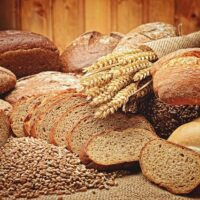The Gluten Thing: Fad or Fact, Part 1
What are your thoughts on gluten? Do you eat it, or not? Why are so many people talking about it these days?
Just this week I received a call from a friend who was in tears. She had just been diagnosed with a severe gluten allergy—AND she’s Italian. Horrors.
Sometimes before we can move forward, we need to have a good cry. 
I get it. I’m right there with her, even though I’m not Italian. It’s tough, yet it really is manageable.
In today’s blog I’ll discuss what gluten is, why it’s in our food, and how it may be affecting your health.
Gluten is a protein composite that’s found in wheat and other grains and starches: barley, bulger, rye, spelt, kamut, triticale, semolina, farina, wheat germ, matzo, graham flour, couscous.
Gluten is Latin for “glue” and acts as an adhesive that holds flour together to make food products. It makes pizza dough stretchy, breads and bagels chewy, and pasta noodles elastic.
It is a common additive that’s found in processed foods, cosmetics, personal care products, and even medications. It keeps sauces and gravies from curdling, as well as volumizing your mascara.
Celiac disease refers to an autoimmune condition that affects numerous systems in the body. Its primary target is the intestinal tract and affects approximately 1% of Americans.
Gluten sensitivity implies that there is some type of immune reaction occurring due to gluten in the diet. 35-40% of the population cannot tolerate gluten.
Gluten sensitivity is very real and causing major health issues for a growing number of people, even if they don’t have symptoms – yet.
Health conditions that may be linked to gluten sensitivity:
- Anxiety
- Depression
- ADHD
- Autoimmune disorders (diabetes, rheumatoid arthritis, Hashimoto’s, etc.)
- Bone pain/osteopenia/osteoporosis
- Dairy intolerance
- Digestive disturbances
- Infertility
- Hives/rashes
- Migraines
- Food malabsorption
- Neurological disorders (dementia, Alzheimer’s, schizophrenia, etc.)
- Seizures/epilepsy
This is not a complete list. A delicious piece of bread can sure wreak havoc on a body. 
Remember, I’m merely the messenger and am continually putting the pieces of my own puzzle of health together. It’s a process.
Next week I’ll address more on this topic: How do you know if you have a gluten issue? What other foods contain gluten? What CAN I eat?
In the meantime, if you’d like more detailed information, check out the book Grain Brain, by David Perlmutter, MD.
If you should find yourself in the 35-40% or wish to eliminate a food group from your diet, I’ve had LOTS of practice.
Finding ways to eat deliciously without gluten and dairy are my specialty. Contact me today and I’ll help you live healthier with food.
Much love,
Carol
“People are getting to this place of understanding that their lifestyle choices actually do matter a whole lot as opposed to this notion that you live your life, come what may, and hope for a pill.”—David Perlmutter


